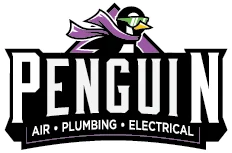If you are tired of waiting for your water to get hot before jumping in the shower, you could be on the verge of a costly repair. With his weekly Tips of the Toolbox on Sonoran Living Live, Penguin Air, Plumbing & Electrical GM Jay Kline has a few pieces of advice for homeowners to cut costs. Extending the life of your hot water heating system may be the last thing on your mind, but it’s crucial when it comes to avoiding unexpected expenses.
How long should a water heater last?
Usually on average about 7-8 years is all that they last here in the Valley. We have really hard water, so water heaters tend to go out pretty early. If your tankless seater heater has lived past it’s anticipated life span, then you should consider investing in a new hot water heater for your Phoenix home.
Many people are not aware of that, so they wait for their water to heat up when there really could be an issue.
It’s a costly repair when Phoenix water heaters go out, even though pipes rarely free in Arizona. The biggest concern for Phoenix homeowners should be the times that these water heating systems burst. Water will literally flood the house damaging more than just the heater itself. This is why proper maintenance, inspection, and safety measures should always be routinely considered.
What can we do to extend the life of our water heater?
One of the biggest and easiest things you can do is drain or flush your water heater. All you have to do is take a simple garden hose, hook it up to the valve, and the valve opens, draining out the water. Let if flush for about 3-5 minutes and it gets rid of a lot of the sediment at the bottom of the tank.
How often should this be done?
Once a year, every year. Attach a garden hose and let it drain outside. If you’d prefer a hot water heater professional aids you in the process, contact us for a free inspection!
Any other tips?
These are anode rods. These are a sacrificial piece of metal that goes into the water heater, so all of the bad stuff in the water corrodes these rods instead of corroding your tank. They extend the life of your tank but if you fail to change those out, the life of your Phoenix water heater will be cut short. We usually recommend changing out anode rods once every two years.
So how are things going to change regarding energy efficiency in 2015?
Just like things are going to change with your air conditioning unit (from 13 SEER to 14 SEER), things will with your water heater. A lot of bigger homes have a 75-gallon and up water heater. Beginning in 2015, the biggest one you’ll be able to buy and install is a 50-gallon. For a lot of people, that means they’re going to have to redo plumbing and add two water heaters and it can be a nightmare. So, if your hot water heater is close to that 8-year mark and you do have one of those larger ones, we suggest changing it out before the end of the year.
And Penguin Air can help you do that:
Penguin Air, Plumbing & Electrical performs Phoenix air conditioning and heating services but also does Arizona water heater and plumbing services, too. We can provide education to help you get the most of your utilities and let you know what federal and local mandates change per year. You can save thousands of money on your water heater by changing now. Plus, keeping up maintenance will help lower your current bills. Whether you possess a gas water heater or an electric water heating system, Penguin Air can provide professional diagnosis along with a solution that suits you best.
